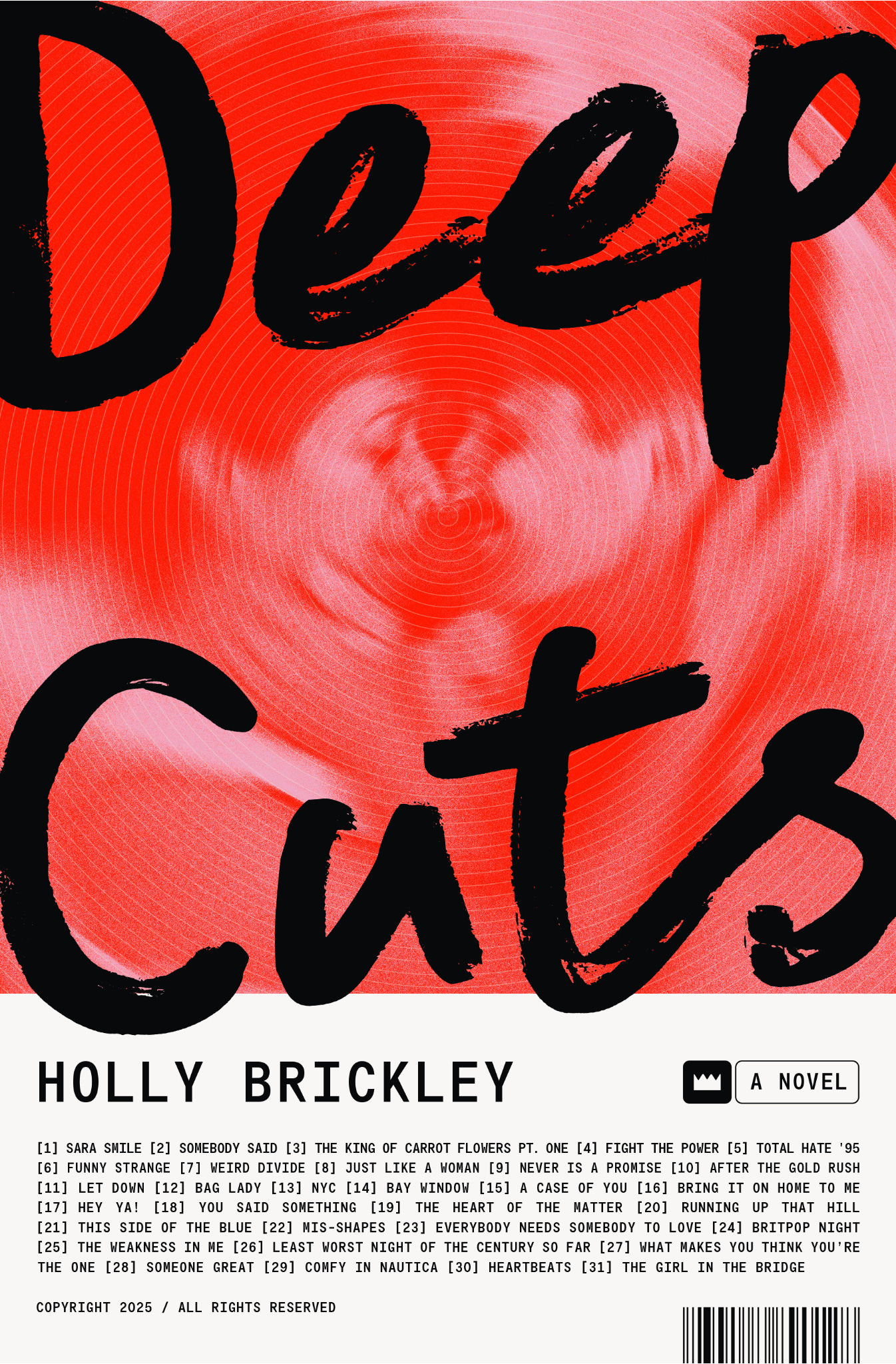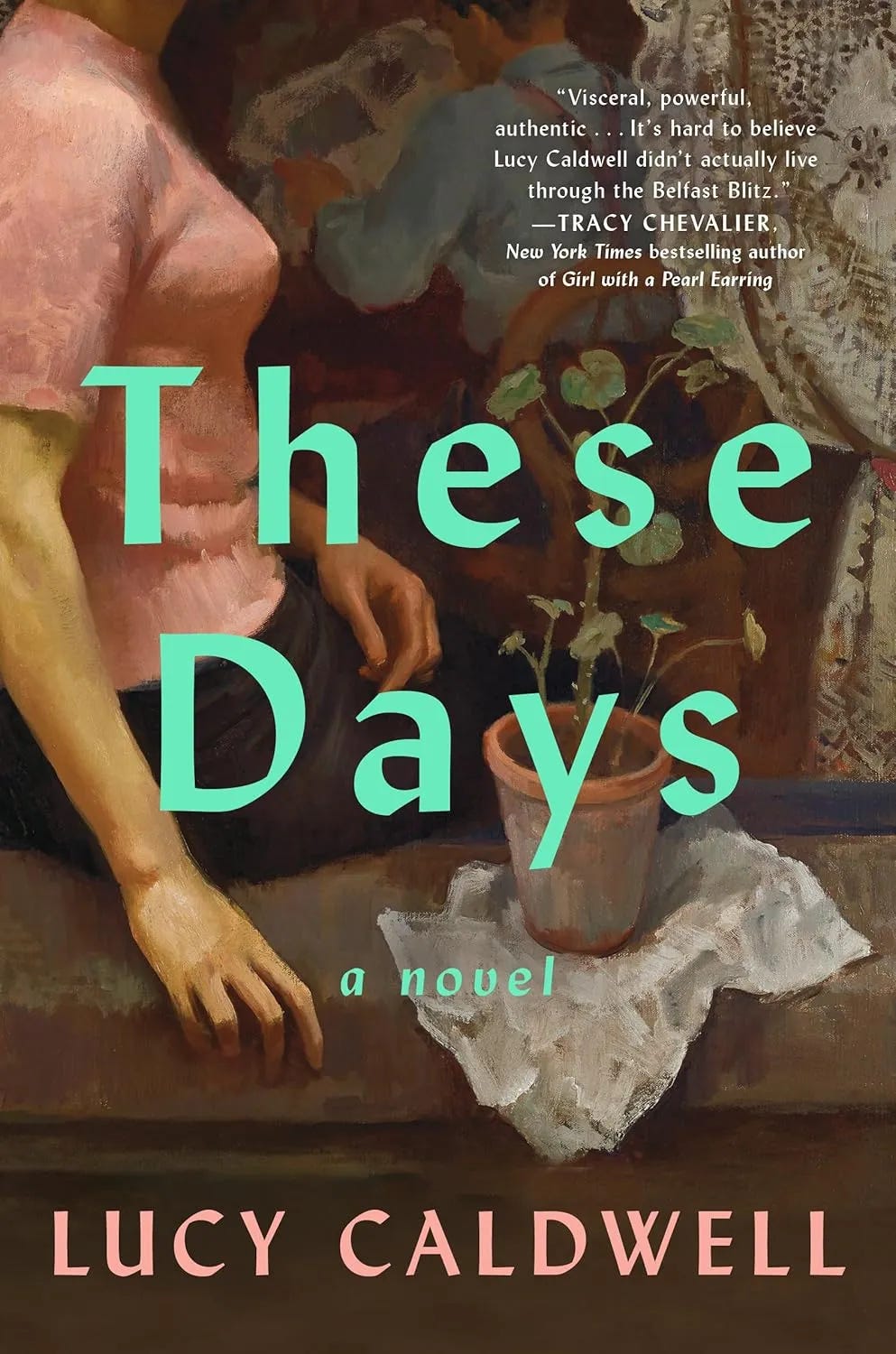Good evening!
This past week, I read an eclectic mix of fiction books, respectively exploring the 2000s music scene, the surveillance state, and the Belfast Blitz. Deep Cuts and The Dream Hotel were published within the past two months, and the US edition of These Days is out on April 8. Let’s get into it.
read📖→
Deep Cuts follows a young woman named Percy Marks from her college days in Berkeley to her 20s in early 2000s New York.
Overview: Deep Cuts is written from Percy’s first-person perspective, and each chapter is named after a song. A “deep cut” is a song that is well-known among critics but is not publicly acclaimed.
The novel opens with a meet-cute in the fall of 2000 in a bar near Berkeley’s campus. Percy sings along to “some garbage song,” and Joe Morrow, who she knew “in that vague way you can know people in college, without ever having been introduced or had a conversation,” catches her. When “Sara Smile” by Hall and Oates begins to play, they debate whether it is a “perfect song” or a “perfect track.” As Percy explains:
A perfect song has stronger bones. Lyrics, chords, melody. It can be played differently, produced differently, and it will almost always be great. Take “Both Sides, Now,” if you’ll excuse me being that girl in a bar talking about Joni Mitchell—any singer who doesn’t completely suck can cover that song and you’ll be drowning in goosebumps, right?
The two click, and Joe, an aspiring musician, asks Percy for some feedback on his music. Percy can’t sing or play instruments, but she has excellent taste (similar to Rick Rubin). The two collaborate and also begin a multiyear situationship. Deep Cuts follows Joe and Percy through their 20s.
Opinion: Deep Cuts is the type of book that I would happily be caught reading on a subway. Sairose Ronan and Austin Butler have already signed on to star in a film adaptation. And it even comes with a playlist! More books should come with playlists. Alas, I read this one on the Kindle app on my iPhone like an animal.
Brickley’s 2000s world feels fully inhabited. I could easily picture the clubs, record stores, and apartments the characters frequent. The novel’s strengths are undoubtedly its realistic characters and the connection to music. However, as my husband always quips, “Strengths are weaknesses.” The realistic characters are messy people in their 20s who are brilliant but self-conscious and constantly get in their own way. If that type of storyline annoys you, you won’t like this book. Additionally, you probably won’t enjoy Deep Cuts if you don’t care about music or cultural criticism.
Percy loves to overanalyze songs, and her opinions on music reflect her own life. As one character points out, “She’s writing about people, really, how people use music to get clarity on themselves. It’s clear to me that Percy’s subject is not music—music is just her channel to get at people.” I personally love cultural criticism (I mean, I have a Substack where I review books ad nauseam), so I enjoyed reading Percy’s monologues.
However, her opinions on music can also be somewhat pretentious. At one point, she explains that “Let Down” by Radiohead is a “retelling of Kafka’s The Metamorphosis.” This might put some readers off, but I think this is somewhat unavoidable when writing about music.
While the musical analysis did not bother me, I felt more mixed on the character development. Deep Cuts is ultimately a coming-of-age story for Percy, and Brickley captures the anxieties and insecurities of youth well. Percy has moments of growth and self-reflection, like with her Lady Bird-like relationship with her mother. However, these moments are scarce, and Percy’s character is somewhat underdeveloped. While Percy matures and figures things out by the end of the book, I’m not sure I fully understand how she gets there.
I also found the chemistry between Percy and Joe to be a little flat. Situationships are common and relatable, even if the self-sabotage and miscommunication can sometimes be frustrating to read. However, I don’t think Brickley developed their relationship enough to warrant this multiyear “will they-won’t they” storyline. I wanted more substance to their interactions, other than Percy sporadically giving feedback on Joe’s music.
Overall: Criticisms aside, I enjoyed Deep Cuts! I would highly recommend this book to someone who wants to read something like Normal People but set in the 2000s with a music focus.
Rating: 3.7/5
Genre: Historical Fiction
Page count: 227 pages
Audio: 9 hours 10 minutes
Movie/TV pairings: High Fidelity, Lady Bird, Almost Famous
The Dream Hotel by Laila Lalami
Dream Hotel is a speculative fiction dystopian novel about a woman detained for having dreams of murdering her husband.
Overview: The novel opens on the morning of the narrator’s thirty-eighth birthday. Sara Hussein has been detained at a “retention center” run by a private company outside of Los Angeles for the past 281 days.
Sara is a digital archivist at the Getty, and she and her husband have young twins. Border agents detained Sara when she returned from a work trip in London after a government algorithm “flagged [her] as an imminent risk.”
In this dystopian world, the government has passed the Crime Prevention Act, which permits people to be detained for crimes they haven’t yet committed (a la Minority Report). The Risk Assessment Administration assigns everyone a risk score based on a “holistic” algorithm. The algorithm considers many sources of information, including familial relations, social media posts, medical history, and, in Sara’s case, her dreams.
Sara has unintentionally consented to have her dreams surveilled. After struggling with insomnia following the birth of twins, Sara had the “Dreamsaver” device implanted in her brain. Dreamsaver promises to give people “deeper sleep, and in fewer hours” through an easy and low-cost implantation. Dreamsaver’s terms of service state: “We do not share your private data with third parties, except as required by a legal enforcement authority or its designated representative. Your content remains yours, and you retain intellectual property rights over it.”
Sara tries not to commit infractions to keep her risk score low so she can be released. The retention center does not consider itself a jail: “This is a retention center, they say, it’s not a prison or a jail. You haven’t been convicted, you’re not serving time. You’re being retained only until your forensic observation is complete.” Lalami follows Sara as she navigates this surveillance state and tries to reunite with her family.
Opinion: I love dystopian novels, and I was excited to read The Dream Hotel to see what all the marketing buzz was about. It was just longlisted for this year’s Women’s Prize. Lalami excels at world-building and captures bureaucracy’s cruel senselessness. Her descriptions of the retention center are disquieting and suffocating.
Unfortunately, not much happens in The Dream Hotel, and the twist is fairly apparent from the outset. The characters also don’t seem to be fully sketched out. While Sara has a backstory, we don’t learn much about her fellow detainees or her husband.
Lalami is clearly inspired by Kafka and Borges (her character reads The Trial and checks out books by Borges at the center’s library) and is obviously trying to make a point about the danger of algorithms and the surveillance state. However, I’m not sure Lalami explores any new territory here.
The world of The Dream Hotel is pretty black and white. It’s hard to imagine someone supporting the detention of a woman based on a random dream of poisoning her husband. We learn that the Crime Prevention Act was passed after a mass shooting, but from what I could tell, her fellow retainees are all harmless and nonviolent. A more nuanced case might have been more thought-provoking—a fact pattern that might make anyone pause. Maybe someone with a history of violent crimes? Or someone who might carry out a mass shooting?
I don’t necessarily think the protagonist needed to be a gray area case—even just a side character with a more complex story or a more substantive discussion of other cases of retainees would have raised the stakes here. Lalami might have chosen sympathetic victims to show that anyone can be swept up in the carceral/surveillance state, but I’m not sure she will change anyone’s views with this storyline.
Overall: The Dream State is an engaging, accessible, and quick read. I think people who don’t read a lot of speculative fiction or dystopian novels would like it, but I don’t think it’s a must-read.
Rating: 3.2/5
Genre: Speculative Fiction (Dystopia)
Notable prizes/book clubs/lists: Read with Jenna March 2025 Pick
Page count: 336 pages
Audio: 11 hours 42 minutes
Movie/TV pairings: Severance
These Days is a historical fiction novel set during the Belfast Blitz in April and May of 1941.
Overview: These Days is divided into three parts: the Dockside Raid, the Easter Raid, and the Fire Raids. Caldwell writes in the close third-person from multiple points of view, but the book primarily centers on the Bell family.
Phillip, the Bell father, works as a doctor and is called to the hospital to help with the air raid victims. Florence, the mother, frets over her family and reflects on her past love. Their teenage son, Phillip, dreams of joining the Air Force once he turns seventeen and no longer needs parental consent to join the armed forces.
And then there are the two Bell sisters—“flighty, impulsive, earnest Audrey” and “kind, stubborn, awkward Emma.” Emma is eighteen and volunteers for the First Aid Post, tending to the injured. She begins a secret relationship with Sylvia, another First Aid Post worker who is eleven years older than her.
Audrey is twenty-one and works at a tax office. She has been dating Richard, a young doctor, for almost a year and contemplates marriage with him: “But his face—his mustache—his earnest, tentative lips—she can’t seem to imagine it on the pillow next to her, waking to it every day. . . . But perhaps, she thought now, you never can.” Amidst the air raids, she tries to convince herself of their love: “His hand is warm and steady and she thinks, with a surge of relief, Of course I love you, of course, of course I do.”
Opinion: These Days has been on my radar for a while, as it has already been published in the UK and won the Walter Scott Prize. I received an advanced copy from the publisher for the US edition, which comes out on April 8.
This book is about the civilian experience during wartime, with a family drama at the center of it. I have studied World War II pretty extensively in my undergraduate and graduate studies, but I admit that I didn’t know much about the Belfast Blitz. I also didn’t realize that Northern Ireland was exempted from conscription. In April and May of 1941, four German raids struck Belfast. Nearly 1,000 people lost their lives, and more than 30,000 homes were damaged.
Caldwell writes in crisp and rhythmic prose. She doesn’t use many metaphors, instead relying on descriptive, vivid language: “Every few minutes the sky flares magnesium white: the entire sky lights up, and the eerie thing is that you feel rather than see it.” She describes the soundtrack of war particularly well: “The long roaring whine of a plane flying overhead, unmistakable, the crackle of what must be gunfire, then a dreadful, dull, booming thud.” Caldwell layers sounds, even when describing the Bell family home, which contributes to the novel’s tense atmosphere:
Her wristwatch said five to six. She could hear the sounds, in the hallway, of her father, arriving home. Doors opening and closing. The distant trill of the bell as her mother rang for Mrs. Price. Paul thundering once again down the stairs, the sudden break in footsteps as he leapt over the side of the banister—and yes, there was the thump, the protesting rattle of the doo-dahs on the bureau, the row of china plates on the sill of the wood paneling, Mother’s admonishment . . . and with it all came that feeling again, that non-quite, almost-nostalgia that she couldn’t seem to shake.
I can’t remember the last time I noticed the use of sound in a novel. It actually reminded me of the sound layers in Christopher Nolan’s Dunkirk.
I don’t necessarily have criticisms of These Days—just a few observations. Caldwell follows multiple storylines in the novel, and the narratives are almost presented like vignettes. This structure is typical in literary fiction (like The English Patient), and it allows Caldwell to explore multiple perspectives of the Blitz. However, there is some cost to this structure. Storylines can feel uneven, and side characters lose opportunities for depth. I personally have no problem with this style and thought Caldwell executed this format well with her prose, but some readers might be put off by it.
Overall: I’d recommend this to someone who likes literary historical fiction or wants to read more about WWII in Northern Ireland.
Rating: 4/5
Genre: Historical Fiction
Notable prizes/book clubs/lists: Walter Scott Prize for Historical Fiction (2023)
Page count: 288 pages
Audio: 8 hours
consumed 🎬🎧🗞️→
I watched this four-episode drama about a thirteen-year-old boy accused of stabbing his classmate. Each episode is filmed in one continuous take, so you watch events as they would play out in real time. The show is brilliantly acted and excruciating to watch.
As one of the show’s creators explains in an interview, the show presents a “complicated portrait of masculinity”:
There’s that phrase, “it takes a village to raise a child.” It also takes a village to destroy a child, and Jamie has been destroyed.
He’s being destroyed by a school system that’s not helping him. He’s been destroyed by parents that are not really seeing him. He’s been destroyed by friends that maybe don’t reach him in the way that he needs to be reached. He’s been destroyed by his own brain chemistry, and he’s been destroyed by the ideas that he’s consumed. All these different elements are in play here.
I love seeing how authors organize their books. Norwegian writer Karle Ove Knaugsgaard’s home is crammed with books.
The Signal group chat leak was unbelievable. In this article, a writer asks, “Am I the JD Vance of my group chat?”
JD Vance, vice president: The derailer. Stumbles in half-aware of what's going on, makes an excuse for why they can’t really be involved in the planning, and then—once the plan is nearly set—chimes in with some last-minute objection.
This is the person who suggests, “What if we all did takeout at my place?” after everyone has agreed on a restaurant. Overly casual, emotional, and says stuff that’s weirdly too personal. Makes it all about themselves.
cooked 🍳→
Broiled cottage cheese on ciabatta topped with olive oil, lemon zest, chopped walnuts, and dill.
Raclette night.














